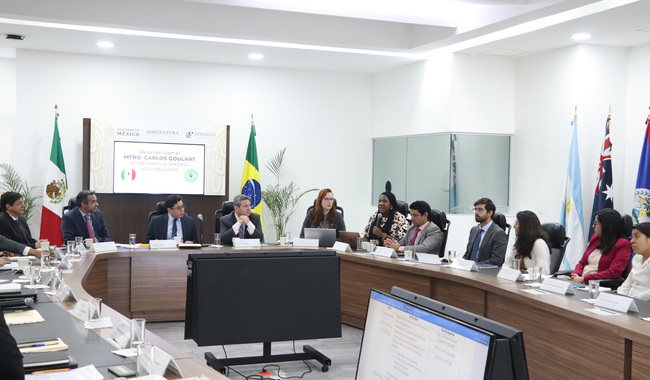Mexico and Brazil are nations with many similarities, which is why it is necessary to work together on cooperation that covers sanitary issues, facilitation of bilateral food trade, country-to-country electronic certification and regionalization, to protect the supply and production of livestock from exotic animal diseases.
This was stated by the chief director of the National Agrifood Health, Safety and Quality Service (Senasica), Javier Calderón Elizalde, and the Secretary of Agricultural Defense of Brazil, Carlos Goulart, at a working meeting held at the headquarters of the Ministry of Agriculture and Rural Development.
Calderón Elizalde emphasized that the impact of the entry of an exotic disease could disrupt food supplies and cause the bankruptcy of an entire sector.
That is why Senasica is working to constantly improve its inspection and surveillance systems, as well as to strengthen immediate response mechanisms, because it is much easier to extinguish an outbreak in time than to eradicate a pest or disease when it has already spread.
We must work together because health knows no borders; the presence of an exotic disease in any country in the Americas is a cause for concern for the entire continent, he said.
He stressed that Mexico is open to strengthening cooperation ties with Brazil and with any nation that wishes to do so, in order to comply with the mandate to protect the countryside and prevent pests and diseases from negatively affecting food supply and the economy of producers and countries.
The Mexican and Brazilian delegations agreed to work on regionalization to prevent the presence of an exotic disease such as African swine fever (ASF) or highly pathogenic avian influenza (HPAI) in any area of the two countries from blocking the export of products from unaffected areas.
Brazil authorizes import of Mexican Persian lemons
Secretary Goulart announced the publication of the requirements for the export of Persian lemons from Mexico to Brazil and informed that, before the end of 2023, the import of Mexican avocados will be authorized.
He pointed out that Mexico and Brazil have many similarities, which we should take advantage of to integrate a block of American countries before the World Organization for Animal Health (OMSA, by its Spanish acronym) to begin discussions on the appropriate way to deal with outbreaks of highly pathogenic avian influenza, caused by the movement of migratory birds.
He informed that this fact has forced the Ministry of Agricultural Defense to triple its surveillance capacity, since three migratory bird routes cross Brazil.
The Undersecretary of Industry and Commerce of the Ministry of Economy, Luis Abel Romero López, indicated that they have a presidential mandate to collaborate in the search for better commercial opportunities and to integrate a block in the American continent so that the population has access to basic foodstuffs at accessible prices and thus control the inflation that afflicts the world.
At the end of the meeting, the Mexican and Brazilian delegations travelled to Senasica's Integrated Services, Diagnostics and Verification Unit (UISDC,by its Spanish acronym), located in Tecámac, State of Mexico.
They visited the National Centers for Phytosanitary Reference (CNRF,by its Spanish acronym), Animal Health Diagnostic Services (Cenasa,by its Spanish acronym) and Pesticide and Contaminant Reference (CNRPyC,by its Spanish acronym), the Canine Training Center (Ceacan,by its Spanish acronym) and the Directorate of Systematization and Sanitary Analysis (DiSAS,by its Spanish acronym).
The meeting was also attended by the Director of International Relations of the Ministry of Agriculture, Fernando Valderrábano Pesquera; the General Directors of Plant Health, Francisco Ramírez y Ramírez; of Animal Health, Juan Gay Gutiérrez and of Phytozoosanitary Inspection, Jorge Luis Leyva Vázquez, as well as the Director of Projects and Institutional Development of Senasica, René Hernández Ruíz.
The Ministry of Economy was represented by the Director General of Light Industries, Roberto Beltrán Ramírez, and the head of the International Trade Negotiations Unit, José Peredo Vázquez.
The Federal Commission for Protection against Health Risks (Cofeprisby its Spanish acronym) was represented by the directors of Special Programs, Verónica Berrones Zapata, and International Affairs, Amina Achaibou Taright, as well as the deputy director of International Affairs, Dalila Fernández Hernández.
Brazil was represented by Ana Lúcia de Paula Viana, Director of Animal Products Inspection; Virgínia Arantes Ferreira Carpi, Coordinator of International Affairs; Fernando Sardenberg Zelner Goncalves, Assistant Secretary for Trade and International Relations; Marco Antonio Araujo de Alencar, Director of the Department of Non-Tariff Business and Sustainability; and Adriane Reis Cruvinel, Agricultural Attaché of the Embassy in Mexico.
